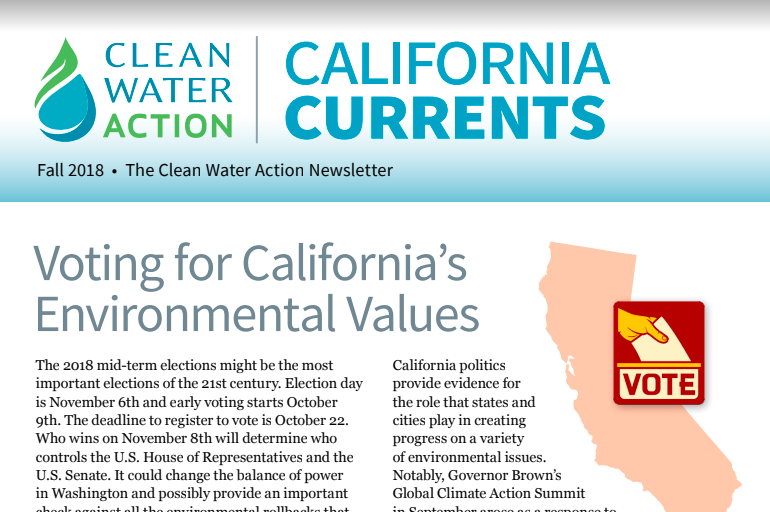In This Issue
- Voting For California's Environmental Values
- Clean Water Action Promotes Climate Emergency Declarations in the Bay Area
- Clean Water Action's Fight for a Safe Drinking Water Fund Will Continue in 2019
- ReThink Disposable Team Welcomes Auditor Grace Lee
- Reducing Air Pollution and Improving Health in Lost Hills
- ReThink Disposable Certified Businesses in Palo Alto Receive Awards for Environmental Leadership
- ReThink Disposable Expands Ambitious Project in the City of Alameda
- Advocacy Updates from the 2018-2019 California Legislative Session
Voting For California's Environmental Values
The 2018 mid-term elections might be the most important elections of the 21st century. Election day is November 6th and early voting starts October 9th. The deadline to register to vote is October 22. Who wins on November 8th will determine who controls the U.S. House of Representatives and the U.S. Senate. It could change the balance of power in Washington and possibly provide an important check against all the environmental rollbacks that the Trump Administration is pushing.
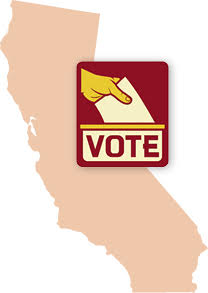
There are also important elections at the state level. This year, California will elect a new Governor who will chart the State’s path forward. California will also elect a new Attorney General who will play a pivotal role in defending our State against aggressive challenges to the robust environmental and social justice laws for which California is distinguished. The elections this year, whether for State Assembly, Senate, City Council, or Mayor, could not be more important for determining if California will continue to embody the progressive values that most challenge our current administration.
Voting and elections are about so much more than filling out a ballot. Clean Water Action encourages members to reach out to their friends, families, and broader communities to encourage voter registration and education about the range of environmental issues for which we need political commitment and leadership.
California politics provide evidence for the role that states and cities play in creating progress on a variety of environmental issues. Notably, Governor Brown’s international climate convening in September arose as a response to the federal administration pulling out of the Paris Accords.
As an environmental organization built on grassroots organizing, Clean Water Action values local political races and political engagement, and the organization emphasizes keeping members updated on issues occurring at all levels of government. In the context of a federal administration that consistently attempts to destroy environmental protections and policies that support a habitable world, the need for state and local elected officials with strong environmental voting records has never been greater!
The principles that guides Clean Water Action’s electoral work is that significant environmental progress depends on grassroots, widespread engagement and input. Do your part by getting out to vote and take your neighbors with you!
Clean Water Action Promotes Climate Emergency Declarations in the Bay Area
Sheila Islam, Clean Water Action California’s Environmental Justice Organizer, has been organizing with Climate Mobilization, an organization whose advocacy is rooted in the belief that climate change requires a national economic response on the scale of the American mobilization of the home front during World War II. Sheila’s climate work has focused on getting Bay Area cities to declare a Climate Emergency, and create a Bay Area Town Hall where cities can support each other in achieving their respective climate goals.
The Bay Area Climate Emergency declarations aim to send a message to world leaders about the urgent need for large-scale climate action, the possibility of impactful climate-change efforts at the local level, and the possibilities for productive collaborations at the regional level. Sheila began working on this campaign in May, and two Bay Area cities (Richmond and Berkeley) have subsequently declared a Climate Emergency. Several other Bay Area cities are currently at work on their declarations.
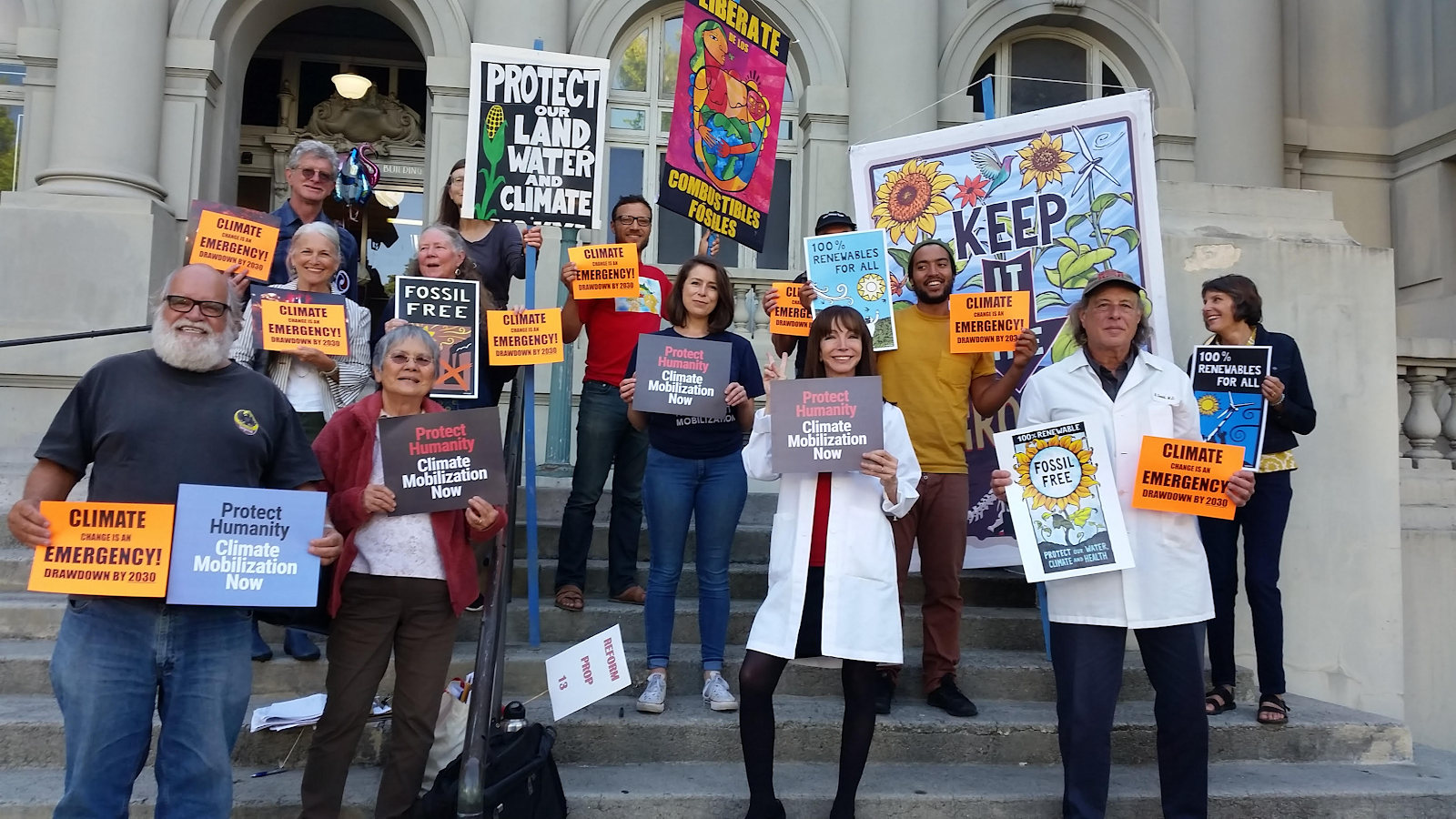
On August 23rd, the Democratic National Committee passed a climate emergency resolution highlighting the threat climate change poses to national security. A day later, Berkeley hosted the Bay Area’s first Climate Emergency Regional Town Hall with 120 attendees from cities all over the Bay Area. Sheila has been working with the phone and field canvass as well as the communications team to get members to send messages to their elected officials urging them to pass similar resolutions. With this support, Clean Water Action has reached members in 75 different California cities urging them to pass similar resolutions.
Sheila’s advocacy for Bay Area Climate Emergency declarations has built upon momentum surrounding Bay Area climate action in the months leading up to Governor Brown’s Global Climate Action Summit and the Rise for Climate, Jobs, and Justice March, both of which took place in September.
Clean Water Action's Fight for a Safe Drinking Water Fund Will Continue in 2019
In election years, the Legislature adjourns at the end of August to give legislators the opportunity to campaign for reelection. Unfortunately, there isn’t a clean divide between the end of session and the beginning of campaign season, and election considerations tend to impact votes.
This was the case with the Safe and Affordable Drinking Water Fund. More than 150 organizations have signed on in support of this funding package, and Clean Water Action had identified legislators who pledged to vote in support. But the June recall of a state senator (Josh Newman from Orange County) and the possibility of a gas tax repeal in November (Proposition 6) combined to make the legislature wary of any new fees, even for something as universally popular as safe drinking water. For this reason, proponents of a safe drinking water fund were denied an opportunity to hold legislators accountable when assembly leadership refused to bring the bills to the floor for a vote.
Clean Water Action is deeply disappointed that two years of legislative effort and broad statewide support from environmental justice, agricultural, business, labor, environment and faith-based organizations did not result in a solution for the million Californians who continue to struggle for access to safe drinking water. Hundreds of communities will have to spend another year with the stress and expense of unsafe tap water. This is not acceptable.
However, Assembly Speaker Rendon did make a commitment to supporters of the fund. On the last day of the legislative session, the Speaker issued a release, saying that “The Assembly is committed to identifying a sustainable funding source to ensure safe drinking water for all Californians.” Clean Water Action will rely on this commitment as the organization reintroduces the package in 2019.
Clean Water Action and its allies wish to recognize a hero in the legislature who diligently championed the bill for two years—Senator Bill Monning, a Democrat from Santa Cruz. Senator Monning has pledged to continue his leadership on the bill in 2019, and Clean Water Action urges members to take a moment to thank him on Twitter.
Clean Water Action, along with its allies, remains committed to this vital legislation, and will work to ensure that the legislature passes the Safe and Affordable Drinking Water Fund early next year.
ReThink Disposable Team Welcomes Auditor Grace Lee
Born in Texas and raised in Los Angeles, our newest Business Auditor Grace Lee brings 15 years of
sustainability and public engagement experience to Clean Water Action. Before moving to Oakland she was the Director of Outreach Programs at The Bay Foundation in LA, where she ran the Clean Vessel Boater Outreach Program, Table to Farm Composting for Clean Air, and piloted ReThink Disposable's effort in Los Angeles.
Grace really loves going to school. Before her current pursuit of Landscape Architecture and Permaculture at Merritt College, she got her B.A. in Applied Ecology from UC Irvine, her M.A. in Environmental Studies from USC, and her Sustainability Certificate from UCLA. When she's not auditing or studying, Grace is either gardening, spinning, or exploring the Bay Area with her partner Trent and daughter Cora.
Reducing Air Pollution and Improving Health in Lost Hills
Marginalized communities in California suffer disproportionate amounts of adverse health impacts from air pollution. This is especially so in Kern County, at the southern end of the San Joaquin Valley, which is bounded by mountains on three sides. The primary pollution sources are major highways, industry, and large-scale agriculture. The air quality in Kern consistently ranks as the worst in the country.

In response, Assembly Bill 617 ( C. Garcia) was approved last year. The bill’s primary intent is to reduce emissions of toxic air contaminants in highly impacted communities. The California Air Resources Board (CARB) is charged with implementing AB 617, and part of the implementation involves funding community-based organizations to help achieve AB 617 objectives.
Clean Water Action was recently awarded a grant from CARB to conduct air monitoring and reduce emissions in Lost Hills, a community located about 45 minutes northwest of Bakersfield. It is immediately adjacent to and downwind of the Lost Hills Oilfield, the sixth largest in California. The town is also next to large agribusiness almond orchards. The town’s 2,200 residents, many of whom are farmworkers, are primarily LatinX and low-income.
Previously, Clean Water Action conducted a survey in Lost Hills, which concluded that residents regularly smell chemical odors coming from the oilfield and suffer from chronic health impacts, including skin rashes, burning and dry eyes, and respiratory problems. Preliminary air monitoring in the town revealed ethanol, acetone, ethyl acetate, methane, and other compounds associated with oil production.
Clean Water Action’s project in Lost Hills will work with residents to place real-time air monitors around town to assess the types, amounts, and frequency of air pollutants. It will also develop strategies to reduce emissions and exposure to air pollutants by collaborating with CARB and the San Joaquin Valley Air Pollution Control District to ensure that existing regulations are effectively enforced.
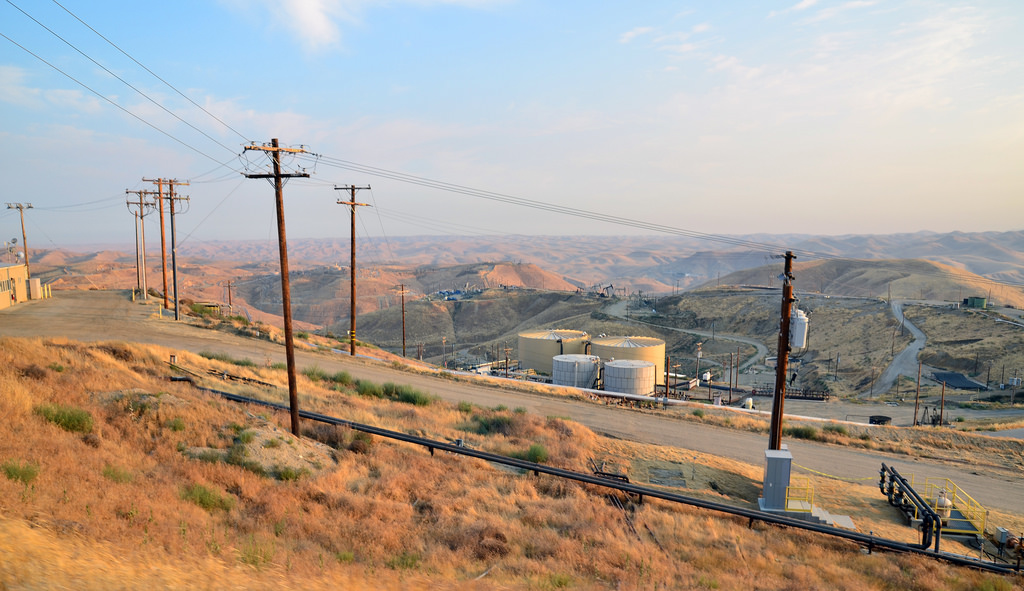
A broader objective of the Lost Hills Project is to strengthen the ability of residents to become advocates for their own well-being. Clean Water Action has organized a community group—Lost Hills En Accion—with elected resident leaders and a number of participants. The group meets regularly to address priority issues ranging from air pollution to drinking water quality.
Like many low-income California communities, Lost Hills has long been unfairly burdened by adverse environmental impacts. This project is a needed first step for the residents of Lost Hills to catalyze improvements in their community.
ReThink Disposable Certified Businesses in Palo Alto Receive Awards for Environmental Leadership
Clean Water Action’s ReThink Disposable program is concluding the second year of a three-year collaboration with the City of Palo Alto to reduce waste and litter in the city’s streets and waterways. Currently, ReThink Disposable certified businesses eliminate half a million disposable packaging items and 14,000 pounds of waste a year.
ReThink Disposable is partnering with the City of Palo Alto’s Public Works Department to empower food service businesses to reduce packaging at the source. Food service packaging generates unnecessary waste and litter that imperils regional waterways and is costly for businesses to continually procure and haul away. Palo Alto’s partnership with ReThink Disposable has allowed the city to focus on preventing single-use packaging, which benefits businesses and the planet far more than attempts to improve recycling, composting and waste-disposal.
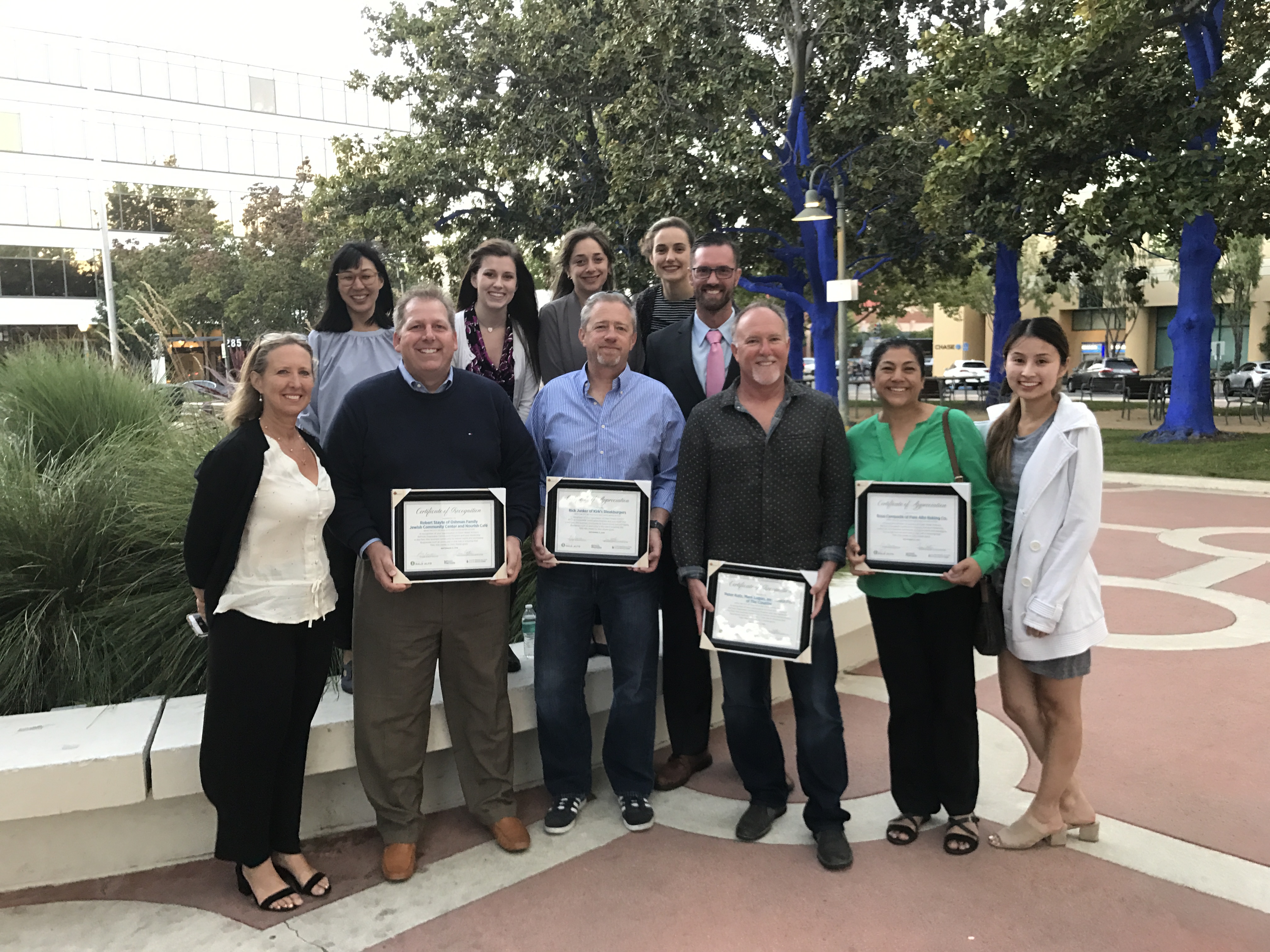
On September 17th, 2018, Palo Alto Mayor Liz Kniss awarded five Palo Alto restaurants for their completion of the ReThink Disposable Certification process and three participating businesses in the process of becoming certified. The event served as a way to elevate businesses whose practices play a significant role in helping the City of Palo Alto achieve its Zero Waste and pollution prevention goals.
Samantha Sommer, California’s Waste Prevention Program Manager, noted: “We are enthusiastic about building momentum to ‘unpackage’ Palo Alto and prevent pollution in the city. Eliminating unnecessary food-packaging is a business-friendly way of helping Palo Alto meet its Zero Waste goals, and the visible reduction in street and waterway litter will continue to increase as more businesses become certified.”
Clean Water Action, along with its allies, remains committed to this vital legislation, and will work to ensure that the legislature passes the Safe and Affordable Drinking Water Fund early next year.
ReThink Disposable Expands Ambitious Project in the City of Alameda
Alameda’s Disposable Foodware Ordinance is the most ambitious plastic-reducing law in the country, and the City of Alameda’s partnership with ReThink Disposable is modelling to other cities what is possible when a city commits to a dramatic reduction in food-service waste. The existing partnership between ReThink Disposable and the City of Alameda lasts until the end of 2018, and participating Alameda restaurants are eligible for initial seed funding to transition toward more reusables.
Thus far, the ReThink Disposable team has recruited 212 Alameda businesses into the technical assistance and certification program, and has 71 participating businesses and 31 certified businesses. The results from the first 6 businesses with completed data indicate that ReThink Disposable certified businesses have eliminated 325,000 pieces of disposable packaging items and 3,000 pounds of waste.
Recently, ReThink Disposable finished certifying the program’s first movie theatre, the Alameda Theatre and Cineplex. The theatre, which is a landmark and a longstanding fixture of the city, has committed to educating the community about waste reduction: before every movie, the theatre will show a humorous, kid-friendly PSA about ReThink Disposable and the theatre’s new reusables.
The Alameda Theatre certification represents an important milestone for the ReThink Disposable program since theatres are a significant but often overlooked locus of unnecessary food-service waste.
Advocacy Updates from the 2018-2019 California Legislative Session
Clean Water Action advocated for a broad range of environmental legislation throughout California’s 2017-2018 legislative session, which ended August 31st.
• With the help of Clean Water Action members, the organization has been instrumental in passing local ordinances, including in Contra Costa, San Mateo, and Santa Clara County, requiring manufacturers to implement convenient collection programs for unused household medicines and sharps such as needles, syringes, etc. In addition to helping keep thousands of pounds of drug waste out of our waterways, these efforts have helped develop the momentum for a statewide program. SB 212 (Jackson/Ting/Gray) establishes an industry-run and funded program, overseen by the state, that enables all Californians to safely dispose of unused drugs and other medical waste at convenient and safe locations. The bill passed with strong bi-partisan support and was signed by Governor Brown.
A package of plastic reduction bills also passed the legislature and were signed by the Governor.
• SB 1335, (Allen) allows only food service packaging that is listed by the Department of Resources Recycling and Recovery (CalRecycle) as being reusable, recyclable, or compostable to be used on state property or in state facilities.
• AB 1884 (Calderon) requires restaurants to only dispense straws upon customer request, thus reducing the seventh largest type of plastic pollution in the environment.
• SB 1263 and SB 1442 (Portantino) both focus on the problem of microplastics in the ocean and California waterways.
• SB 1263 requires the state’s Ocean Protection Council, pending available funds, to adopt and implement a Statewide Microplastics Strategy. SB 1442 requires that the State Water Resources Control Board implement four years of drinking water testing for microplastics and public disclosure of the results.
• AB 958 (Ting), a bill sponsored by Clean Water Action and the Environmental Working Group, would have required that any food package containing toxic fluorinated chemicals, known as PFASs, would necessitate a warning label. Unfortunately, the bill failed due to opposition from the chemical industry and Bill Quirk, the chair of the Environmental Safety and Toxic Materials Committee.
